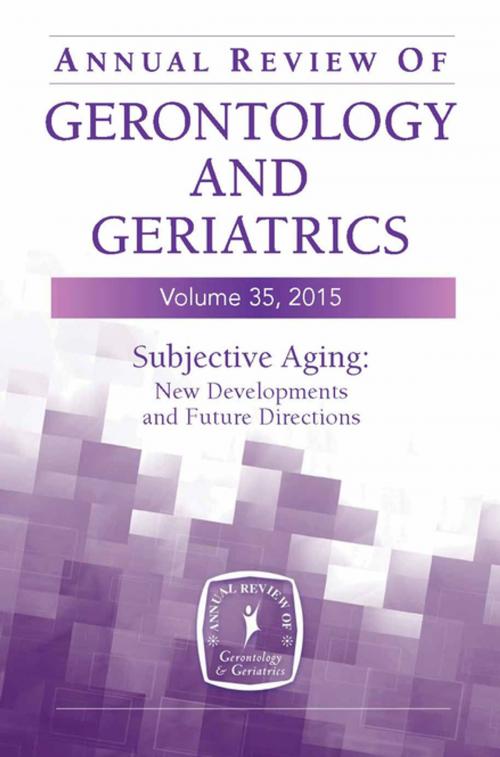Annual Review of Gerontology and Geriatrics, Volume 35, 2015
Subjective Aging: New Developments and Future Directions
Nonfiction, Health & Well Being, Medical, Specialties, Geriatrics, Social & Cultural Studies, Social Science, Gerontology, Psychology, Developmental Psychology| Author: | ISBN: | 9780826196521 | |
| Publisher: | Springer Publishing Company | Publication: | December 20, 2014 |
| Imprint: | Springer Publishing Company | Language: | English |
| Author: | |
| ISBN: | 9780826196521 |
| Publisher: | Springer Publishing Company |
| Publication: | December 20, 2014 |
| Imprint: | Springer Publishing Company |
| Language: | English |
How do individuals perceive the experience of aging? Can this perception predict such developmental outcomes as functional health or mortality? The 35th volume of ARGG encompasses the most current and fruitful research findings about the subjective experience of aging and describes how they fit within a theoretical framework. It reflects a new and advanced stage of development in the discipline of subjective aging and will be a building block for future theoretical and empirical work in this area of study.
The book integrates presentations from a series of recent workshops attended by an international cadre of subjective aging researchers, the results of several longitudinal studies from across the globe, and theoretical propositions from studies that are ongoing. Chapters-reviewed by independent scholars for "quality control"-- address major conceptual approaches and key challenges to subjective aging research; research designs, empirical findings, and methodological issues; and the implications of subjective aging research on interventions, society, and the changing contexts of aging.
Key Topics:
- Subjective aging and awareness of aging
- Connections between research on subjective aging and age stereotypes and stigma
- Linking subjective aging to changing social meanings of age and the life course
- Psychological and social resources and subjective aging across the adult life span
- Experimental research on age stereotypes
- Domain-specific approaches and implications for addressing issues of developmental regulation
- Subjective aging as a predictor of major endpoints of aging and development
- Exploring new contexts and connections for subjective aging measures
- Changing negative views of aging
- Subjective aging research from a cross-cultural perspective
- Subjective aging research and gerontological practice
- Future directions for subjective aging research
How do individuals perceive the experience of aging? Can this perception predict such developmental outcomes as functional health or mortality? The 35th volume of ARGG encompasses the most current and fruitful research findings about the subjective experience of aging and describes how they fit within a theoretical framework. It reflects a new and advanced stage of development in the discipline of subjective aging and will be a building block for future theoretical and empirical work in this area of study.
The book integrates presentations from a series of recent workshops attended by an international cadre of subjective aging researchers, the results of several longitudinal studies from across the globe, and theoretical propositions from studies that are ongoing. Chapters-reviewed by independent scholars for "quality control"-- address major conceptual approaches and key challenges to subjective aging research; research designs, empirical findings, and methodological issues; and the implications of subjective aging research on interventions, society, and the changing contexts of aging.
Key Topics:
- Subjective aging and awareness of aging
- Connections between research on subjective aging and age stereotypes and stigma
- Linking subjective aging to changing social meanings of age and the life course
- Psychological and social resources and subjective aging across the adult life span
- Experimental research on age stereotypes
- Domain-specific approaches and implications for addressing issues of developmental regulation
- Subjective aging as a predictor of major endpoints of aging and development
- Exploring new contexts and connections for subjective aging measures
- Changing negative views of aging
- Subjective aging research from a cross-cultural perspective
- Subjective aging research and gerontological practice
- Future directions for subjective aging research















